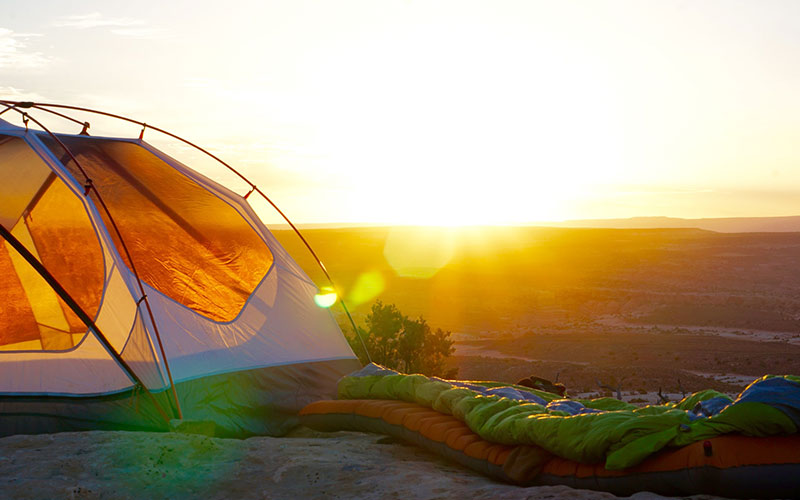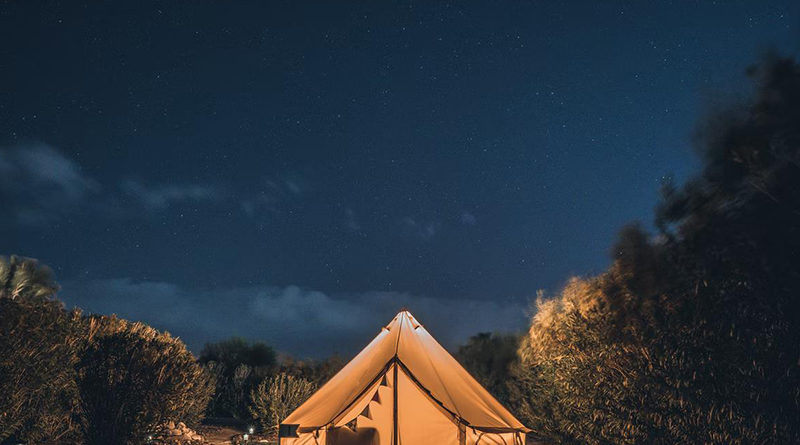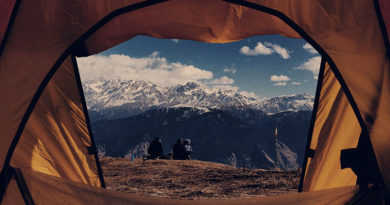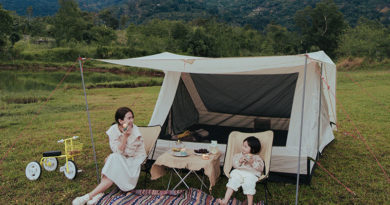11 Important Things to Do For Your Camp Tent to Keep Bugs Away
Camping is perhaps one of life’s most important experiences that one must have before they die. It is not only the best activity for a group but also the most enjoyable when everything goes as planned.
The refreshing physical activity perhaps has only one downside to it – the existence of bugs. No matter what you do, they never seem to stop invading your privacy or your food. It is even worse when there are cases of deadly diseases going on and the last thing you want is to be bitten by a disease-carrying critter.
Though it is not possible to void you completely of bugs on your camping trip, there are definitely ways to stop them from entering your tent and campsite in general.
We bring you a few tips on while camping how to keep bugs away that you can use when you are out there in the wild.
1. Bug Sprays or Creams
The first and foremost method of keeping bugs away from your tent during camping is to use the classic method of using bug sprays and creams.
Make sure that the one you pick has a good amount of DEET, which is a bug repellent ingredient, in it. You not only have to put in on the parts of your skin which will be exposed but the same can also be put on your clothes and bags to keep the bugs away.
DEET makes the surface you apply it on taste bad as well creates an odor that is disgusting to bugs, so just using a bug spray or cream can be more efficient than going forth with extra items or purchases.
Note that it is not harmful in any way if used properly. Bug sprays and creams should only contain about 10% or 30% concentration of DEET. It will also be useful if the bug-repelling items are waterproof as you will be in contact with water a lot if you are on a camping trip!
2. Vinegar
If you do not have bug spray or cream, a natural bug-repelling replacement for it is vinegar. Bugs do not particularly like the strong stench of the liquid and both normal and apple cider vinegar will work. It is safe to spray it on the skin, spread it around the tent, and also apply it to your clothes and items.
Using vinegar directly can be a bit messy and uncomfortable to work with. Hence, what you can do is use it to make a spray for easy application. This process can take two to three weeks, so remember to start it before you go camping.
All you need to do is keep some tablespoons of sage, mint, dried lavender, thyme, and rosemary, in a container (preferably glass). Then, add approximately 32 ounces of vinegar and keep it for around three weeks.
You need to shake it properly every day and on the day you open it, drain out the herbs.
Dilute it with a little water to make the spray and voila! Your very own bug repellent. The only downside? It is a stinky process.
3. Fire
We all know that insects get attracted to light and flame easily. You can use this to your advantage by making it a trap for them! It is a given that if you are on a camping adventure, then you will be building a campfire sooner or later.
Remember that your campfire is all-important – for grilling dinner as well as keeping bugs away. The smoke from the fire acts as a repellent and the same can be achieved by making a tiki torch when you have to put out your campfire.
Candles will also have the same effect – though they would not be as strong as a campfire. However, a good way to use candles at a campsite is to get the special bug-repelling ones.
A good investment for camping enthusiasts is the citronella candle. The pungent smell produced by these candles will drive the bugs away as well as act as a good source of light if put out across the campsite.
Not to mention, a campsite surrounded by lit candles would provide a scenic experience.
4. Bug Killing Diffusers and Coils

If you are not a big fan of stenches, smoke, or unfamiliar sprays, then what you can do is get a diffuser or a coil to ward off insects.
Pyrethrum infused coils (ones that are used to kill mosquitoes) are readily available in the market. All bugs and insects hate the scent and the smoke that comes with it.
Some bug-repellent companies also manufacture particular diffusers which are made using a pesticide called metofluthrin.
Diffusers have the most longevity out of all the bug-repelling items we have mentioned and can go on for a straight 12 hours. They also guarantee up to an 80-100% chance of keeping you safe from insects as they cover a wide range.
5. Get Food That Insects Hate
A lot can be done with the food you choose to bring to your campsite too. You are in for luck if you have garlic, onions, or any sort of citrus fruits on you as insects hate the scent they give out.
It is not possible to keep onions and garlic around the campsite, but considering you will have an open fire, it is a good idea to cook food with these particular ingredients. Both the smoke and the scent will help keep little buggers away.
If unfortunately, you do not have any of these items, citrus fruits will work as well. The peels of these fruits can be rubbed on the skin to act as a natural repellent in case you do not have anything on you. While it may leave you smelling like your food, for emergencies, it is a great idea.
6. Nettings
If you are a light sleeper, a good investment for your camping trip would be to get mosquito netting or a screen room.
Screen rooms are basically large tents with walls that are screened in using nets for ventilation and to let you see outside. They will not keep you free from all the hassle with the sprays and the repellents and guarantee you a good night’s sleep.
If you are on a budget and only have mosquito netting, a DIY screen room can be made by tying your netting onto the trees to create a canopy for sleeping. This might take some effort, but if you have no choice, it will be a good learning experience for camping enthusiasts.
7. Bug Repelling Stick-Ons
Kids can be a handful when it comes to any sort of safety and protection. They would do anything but the thing that is right for them! This can become a problem if you have little ones with you at your campsite – especially since they make a huge fuss about being sprayed or dabbed with repellent cream.
For these cases, the perfect invention does exist. Bug repelling stickers, bandaids, and bracelets can simply be strapped on or stuck somewhere nearby as protection. These products emit bug-repelling chemicals that act as a shield around you and are easy to use with children.
This is also very helpful as it can be dangerous for young ones to have DEET-containing products directly applied to their body as they can be careless by nature.
8. Wear Full Body Clothes
Camping is an experience that involves a lot of risks and problems other than bugs that may arise during your stay.
The outside is also pretty cold once dawn sets in and the night rises. Apart from mosquitoes that are active throughout the whole day, you also need to be careful and protect your skin from dangerous germs and substances.
Wearing long shirts and pants is a good idea to keep yourself free of bites and scratches. Make sure to remember not to wear black as it can be awfully hot during the summers.
If you are not a fan of long clothing and are a camping enthusiast, it is a good idea to get insect repellent clothes. These are specially infused clothing that keeps bugs away from you.
Camping fanatics recommend it, though it can be a bit high on the budget. Hence, according to what suits you best, cover yourself up well.
Another tip when selecting colors of the clothes is to not choose the color blue. Studies found out that mosquitos are specifically attracted to the color blue.
9. A Clean Campsite

Bugs are usually always everywhere at a campsite – but in dirty ones, they tend to flock in more.
What’s more – they do not just get attracted to your food, but your trash as well! Therefore, it’s important to remember to dispose of your waste in a sensible and responsible manner.
Unwashed utensils, half-empty food cans, and open containers are all invitations to little bugs swarming in from everywhere. So if you want your tent to be as free of bugs as possible, remember to keep your surroundings clean.
- Keep bags/bins dedicated just for the purpose of throwing the trash. By doing this, you accumulate it in one corner where you will probably not be most of the time and will also help insects get diverted to one place
- Remember to wipe off dirt and spillings wherever you do not want them – table tops, grills, chairs to avoid getting your surroundings dirty
- Wash all dishes after eating and make sure that all the garbage is kept well away in one spot away from your bed
No one likes a dirty campsite. Hence, remember to dispose of the waste you make responsibly as well after you are done camping.
10. Do Not Camp Near Water
Choosing the perfect camping spot is never easy. While a scenic spot is the number one priority of a camping adventure, and anything near a water body like a lake or a river seems to be the ideal spot, it is better to stay as far away as you can from water bodies when choosing a spot to camp in for the night.
Water is the breeding place for many insects – all that can bite and cause infections as well. The dampness from the area near a water body becomes a hotspot for mosquitos, chiggers, common mites, and ticks that will add to your bug problem.
11. Homemade Oil Repellent
Aside from homemade vinegar recipes, there is also an option of making a homemade oil repellent for your next camping trip.
Many essential oils are made to be bug-repelling, but if you are on a tight budget and only need it for your one camping trip, then they can be made at home as well. You can make it in the form of a spray as it comes in handy for protecting all your things from insects.
All you need to do is mix at least 10-20 drops of your essential oil with 1 tablespoon rubbing alcohol, half a cup of vodka with half a cup of water. The concoction needs to be shaken well before use in order for the oil and water to mix.
The following essential oils are good for your skin as well as a container of bug-repelling properties:
- Citrus
- Garlic
- Thyme
- Lemongrass
- Lavender
- Cinnamon
- Peppermint
Your homemade, essential oil repellent will be a natural way to keep bugs away as well as smell good to you.
Here’s a article that shows exactly what Essential Things to Carry While on a Trekking Trip
Conclusion
Bugs are a natural occurrence when camping and it is almost impossible to avoid them completely. You cannot get rid of them, but you can definitely keep them away from the methods we have mentioned. It is also advisable to go for winter camping instead of summer camping as insects tend to be lesser during those times. The important thing to remember is to pick up after yourself and remember to keep the camping site a clean and natural space to keep them clear of insects that actually may cause harm.



